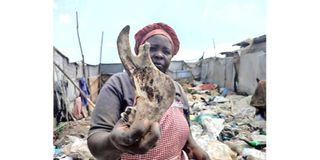Deferred dream: Waste picker recounts ordeal of losing 81 pigs

Agnes Nyaroya, a waste picker at Gioto dumpsite in Nakuru County, shows bones she collects to sell at Sh5 a kilogramme, on April 6, 2022.
What you need to know:
- Agnes Nyaroya walked onto Gioto dumpsite in Nakuru County with a mission to be financially independent.
- She had seen other women make a living from selling sorted waste they collected from the dumpsite. And so, she decided to put her energies in this waste picking business.
Seventeen years ago, Agnes Nyaroya walked onto Gioto dumpsite in Nakuru County with one mission—to be financially independent.
As a young woman from Vihiga who had just dropped out of Form One, she had no professional skills. But she was armed with something else—ambition to lead a better life.
She had stopped working as a nanny fetching a monthly pay of Sh900.
“It was too little to send to my parents and spare some for myself. So, I quit,” she says.
She had seen other women make a living from selling sorted waste they collected from the dumpsite. And so, she decided to put her energies into waste picking business.
On the dumpsite, he found a man, a fellow waste picker, and they got married. They had five children together. Sadly, her husband died in January this year.
Then, in 2005, she would collect an average of eight bags each day from Monday to Friday. She would collect bones, plastic bottles, scrap metal and tin cans, all of which she sold at different rates. She would make at least Sh600 daily.
Competition
But over time, as the garbage collectors realised the "wealth" in the business, they started sorting the waste from the point of collection. Therefore, the waste that now landed on the dumpsite reduced significantly.
“There are also more people competing for the little waste,” she explains.
“For instance, you will find more than six people sorting out waste from one truck unlike before when we would be three or four. These days, filling three bags in a bag is a miracle.”
Thus, the selling days have reduced from six to one, that is only on Saturday. The earnings are pitiable.
A kilogramme of waste bones, for instance, sells at Sh5 and often she makes a weekly collection of not more than 50kg.
And if she is lucky to crush 40kg of glass bottles, she will only earn Sh70.
“You will need 200 bottles or more depending on the size to make 40 kilogrammes. In 2005, that would be achievable in a day, but nowadays, it takes even two weeks to collect that number of bottles,” she says.
Faced with a decline in income and children to feed, Ms Nyaroya had to find a way out of her financial crisis.

Agnes Nyaroya, a waste picker at Gioto dumpsite in Nakuru County, in her pig pen just across the barrier fence off the dumpsite on April 6, 2022.Moraa Obiria | Nation Media Group
In 2013, she found a side job of feeding pigs for a businessperson in Nakuru.
She gave her all, doing her job so well that her employer gave her a sow, which later farrowed a litter of nine piglets. By last year, she had 84 pigs. Then a disease struck, killing 81 of them. She was devastated but never lost hope.
Her pig pen is just across the barrier fence off the dumpsite. Some of those who pick waste live there.
“My plan was to stop this work last year. I was set to go. I had planned to sell the pigs at Sh12,000 each, then buy a piece of land and build our family house,” she says.
“Now, I’m back to zero. I can’t explain how that loss made me feel, but I won’t give up. I know my dream will still come true. In five years, I won’t be doing this job.”
Already, the three sows that survived have farrowed 15 piglets. And so It's not all doom and gloom, she says.





